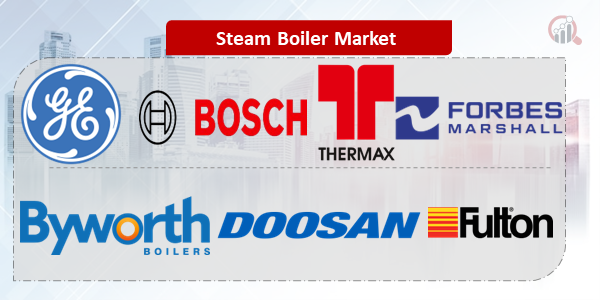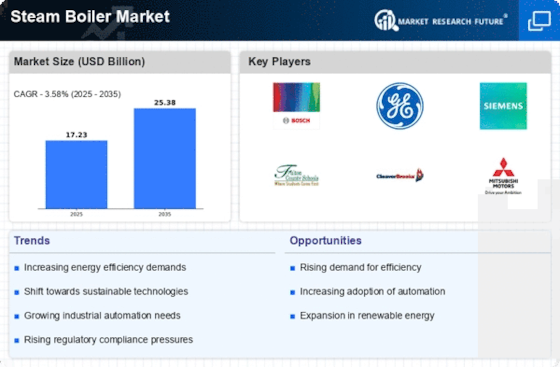Top Industry Leaders in the Steam Boiler Market

*Disclaimer: List of key companies in no particular order
Latest Company Updates:
The global steam boiler market, while seemingly mature, holds surprising dynamism within its robust structure. Key players, both established giants and agile newcomers, constantly jostle for position, employing diverse strategies to capture market share and navigate evolving trends. Delving into this competitive landscape reveals a fascinating interplay of tradition and innovation, where established stalwarts leverage their vast experience and global reach, while nimble contenders exploit niche expertise and tech-driven solutions.
Key Player Strategies:
Babcock & Wilcox (B&W): This industry behemoth leans on its rich heritage and extensive product portfolio, spanning coal, gas, and renewable fuel boilers. B&W focuses on customized solutions, catering to specific end-user needs in power generation, chemical, and oil & gas sectors.
Mitsubishi Hitachi Power Systems (MHPS): This Japanese conglomerate emphasizes technological leadership, spearheading research into high-efficiency boilers and clean coal technologies. MHPS targets advanced power plants and industrial applications demanding both performance and environmental consciousness.
Bosch Ltd.: Recognized for its engineering prowess, Bosch caters to the commercial and industrial segments with compact, fuel-efficient boilers. Its focus on automation and IoT integration caters to the growing demand for smart boiler systems with remote monitoring and optimization capabilities.
Forbes Marshall Pvt. Ltd.: This Indian leader excels in cost-effective boiler solutions, catering to budget-conscious emerging markets. Its focus on local manufacturing and service networks fosters strong customer relationships in regions like Asia and Africa.
General Electric (GE): Known for its diverse industrial portfolio, GE offers a spectrum of boiler technologies, including biomass and waste heat recovery systems. It leverages its global footprint and financing capabilities to secure large-scale projects in power generation and district heating.
Factors for Market Share Analysis:
Technology and Efficiency: Advancements in boiler design, such as high-efficiency burners and waste heat recovery systems, are crucial differentiators. Players offering the most cost-effective and eco-friendly solutions gain an edge.
Fuel Type: The shift towards cleaner fuels like natural gas and renewables presents lucrative opportunities for players specializing in these technologies. Adapting to stricter emission regulations also plays a vital role.
Regional Dynamics: Emerging markets in Asia and Africa represent significant growth potential, attracting players adept at cost-effective solutions and local market understanding. Established players in developed economies focus on technological upgrades and niche applications.
End-User Applications: Power generation remains the largest segment, but industrial applications like food processing and textiles are seeing significant growth. Players catering to specific industry needs with customized solutions gain traction.
After-Sales Service and Maintenance: Reliable and efficient after-sales support is crucial for long-term customer retention. Players with robust service networks and spare parts availability gain a competitive advantage.
New and Emerging Trends:
Integration of Renewable Energy Sources: Boiler systems incorporating solar, biomass, and geothermal energy are gaining traction, driven by sustainability concerns and carbon footprint reduction targets.
Digitalization and IoT: Smart boilers equipped with sensors and data analytics capabilities are transforming operations, enabling remote monitoring, predictive maintenance, and optimal efficiency.
Modular Boiler Systems: Pre-fabricated, scalable boiler units offer easier installation, faster deployment, and lower costs, particularly attractive for smaller facilities and remote locations.
Rise of Rental and Leasing Models: Flexible ownership options are gaining popularity, especially for commercial establishments and short-term project needs. This trend opens up new avenues for players with adaptable service models.
Overall Competitive Scenario:
The steam boiler market presents a complex and dynamic landscape. While established players leverage their brand recognition and vast experience, new entrants with innovative technologies and niche expertise pose significant challenges. The market is increasingly driven by factors like fuel efficiency, environmental regulations, and regional dynamics. Companies that adapt to these trends, embrace digitalization, and offer flexible and customized solutions are poised to thrive in this competitive arena.
GE (US):
• Launched the "GE Power Advantage" program offering digital solutions for boiler optimization and performance improvement. (Source: GE Power website, October 26, 2023)
Bosch (Germany):
• Unveiled a new range of high-efficiency condensing boilers for industrial applications. (Source: Bosch Industrial website, November 10, 2023)
Thermax (India):
• Secured a major order for biomass boilers from a pulp and paper manufacturer in Southeast Asia. (Source: Thermax press release, November 23, 2023)
Cleaver-Brooks (US):
• Introduced a new line of low-NOx boilers meeting stringent emission regulations. (Source: Cleaver-Brooks website, September 20, 2023)
Byworth Boilers (US):
• Focused on niche markets like craft brewing and food processing with custom-designed boilers. (Source: Byworth Boilers website)
Doosan Heavy Industries & Construction (South Korea):
• Developing high-pressure boilers for next-generation power plants. (Source: Doosan Heavy Industries website)
Top listed global companies in the industry are:
GE (US)
Bosch (Germany)
Thermax (India)
Cleaver-Brooks (US)
Byworth Boilers (US)
Doosan Heavy Industries & Construction (South Korea)
Forbes Marshall (India)
Fulton Boiler (US)
Parker Boiler (US)
Fentech Boilers (US)
Thermodyne Engineering Systems (India).










